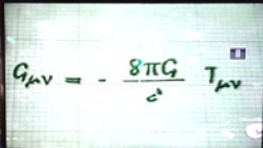Topics: Einstein, General Relativity, Special Relativity
Sometimes I get questions clear out of the blue that are a joy to answer, as curiosity should be rewarded with a sincere response.
A friend emailed me (I left their name out to protect their privacy) and said: "I'm interested in many different things - I love How The Universe Works and Secrets of the Universe type programs. Of course there are things I don't understand but I get the basics. Anyway, I am watching one entitled 'Was Einstein Wrong?' and they talk about his General Theory of Relativity AND his Special Theory of Relativity. My question is are they the same theory and are names the interchangeable? When I search online for General it refers to E=mc2. When I search for Special, E=mc2 is the only equation that's displayed."
My friend also asked about this:
The program periodically shows this...but doesn't say what it is and no, I have no idea what it means, but is this the Special theory?
I have to admit, it's a refreshing thing not being trolled and actually asked questions about science.
I purposely didn't go into the math (but I left reference links below for the stout-of-heart), this was my reply:
Dear (friend's name omitted),
1905: The Special Theory of Relativity – think speed. Prior to Einstein, everything was in a slower, Newtonian universe, and Newton’s 3 Laws of Motion applied to things like inertia, acceleration and recoil.
However, as we started discovering things like the speed of light (186,232 miles per second, 300,000,000 meters per second), measured in the Michelson-Morley Experiment. “C” is just shorthand. It’s kind of lazy, but everyone knows what you mean when they see it or say it.
Alpha particles, electrons and measuring their speeds at some fraction of c, the Newtonian rules didn’t apply anymore. Special Relativity deals with objects or observers (or, frames of reference) that are moving with uniform velocities relative to each other, hence “relativity.”
Albert Einstein determined that the laws of physics are the same for all non-accelerating observers, and that the speed of light in a vacuum was independent of the motion of all observers. This was the theory of special relativity. It introduced a new framework for all of physics and proposed new concepts of space and time, coining a new term for the public lexicon: space-time.
This was also called Einstein’s annus mirabilis, or “Miracle Year.” He published four papers: The Photoelectric Effect, Brownian Motion, Special Relativity and Mass-Energy Equivalence (E = mc-squared). A video: https://youtu.be/91XI7M9l3no
1915: Einstein then spent ten years trying to include acceleration in the theory and published his theory of general relativity in 1915. In it, he determined that massive objects cause a distortion in space-time, which is felt as gravity. Think of a bowling ball on a trampoline, in this case, space-time is the trampoline, the stars, planets, brown dwarfs, white dwarfs, black holes the bowling balls. One of the applications of General Relativity is Global Positioning Systems (GPS). This theory was confirmed in 1919 during a solar eclipse where Gravitational Lensing (bending of starlight) was observed.
Nerd Trivia: 3/14/2015 was Einstein’s birthday, and such was used as National Pi Day (3.14159 – get it?), and 100 years on November 25th of his paper on General Relativity, but you can’t get Pi out of 11/25/15, o_9.
On the symbolic equation above:
This is Tensor Calculus, or Differential Geometry. Einstein learned it from Grossmann (a mathematician) to describe space-time curvature in General Relativity. The Mu (μ) and Nu (ν) are Tensor coordinates; G in the numerator next to 8π is Newton's gravitational constant (“c” in the denominator you know). Believe it or not, Einstein struggled a little bit as Grossmann taught him; Einstein in turn taught him physics. His related quote:
“Do not worry about your difficulties in mathematics. I can assure you that mine are greater.”
One of my favorite quotes from Einstein. Albert Einstein was a contemporary of Paul Robeson, and due to the way Jews were treated (and exterminated) in Germany by the Nazis, he was a champion of Civil Rights:
From "Ideas and Opinions," by Albert Einstein:
"It seems to be a universal fact that minorities--especially when the individuals composing them can be recognized by physical characteristics--are treated by the majorities among whom they live as an inferior order of beings. The tragedy of such a fate lies not merely in the unfair treatment to which these minorities are automatically subjected in social and economic matters, but also in the fact that under the suggestive influence of the majority most of the victims themselves succumb to the same prejudice and regard their kind as inferior beings. This second and greater part of the evil can be overcome by closer association and by deliberate education of the minority, whose spiritual liberation can thus be accomplished.
"The resolute efforts of the American Negroes in this direction deserve approval and assistance."
Mein Weltbild (my conception of the world), Amsterdam: Querido Verlog, 1934, pp 117-118.
Einstein’s advice to a little girl that wanted to be a scientist: Dear Professor Einstein
As you can tell, I'm a BIG fan. :-)
Blessings,
Reggie
The long answer on “c”: http://math.ucr.edu/home/baez/physics/Relativity/SpeedOfLight/c.html
Helpful math reference links:
Wm. Robert Johnson: Some equations of special relativity
Wikipedia: Einstein Field Equations (EFE), not to be confused with "BFE," of course.
Wolfram Physics
Special Relativity
General Relativity
"Let us remember: One book, one pen, one child, and one teacher can change the world." Malala Yousafzai
"It is the supreme art of the teacher to awaken joy in creative expression and knowledge." Albert Einstein

Comments